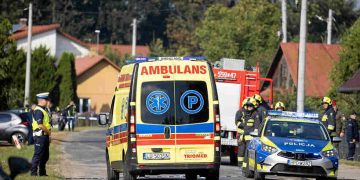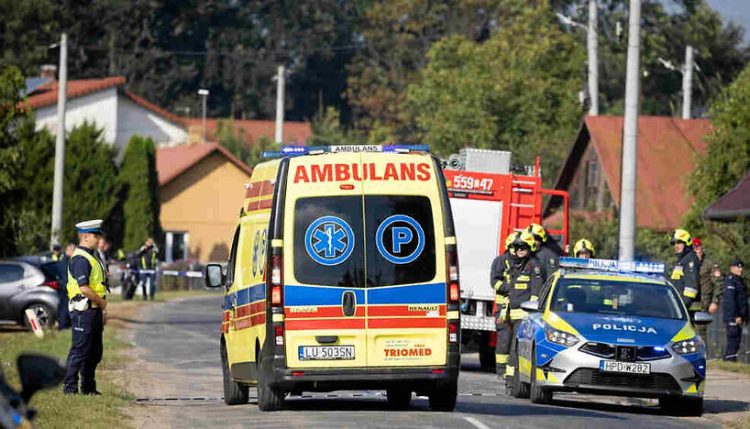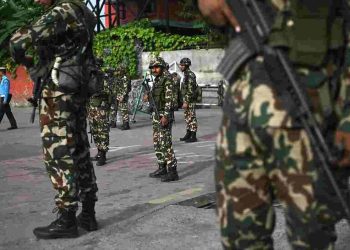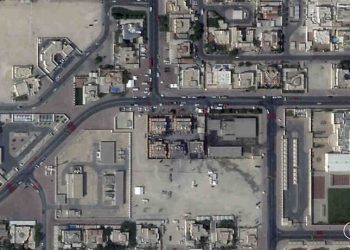Poland announced on Wednesday that, together with NATO allies, it scrambled fighter jets and successfully shot down several Russian drones that crossed into its airspace during Moscow’s latest strikes on Ukraine, describing the move as an “act of aggression.”
“Last night Polish airspace was breached by a large number of Russian drones,” Prime Minister Donald Tusk said in a post on social media. “Those drones that posed an immediate threat were destroyed. I am in constant contact with NATO’s Secretary General and our allies.”
Poland’s military confirmed it deployed aircraft to engage “hostile objects” within its airspace, marking the first time a NATO nation has taken such action since the war began. On its X account, the military described it as “an unprecedented breach of Polish airspace by drone-type objects” and labeled it “an act of aggression that posed a real threat to our citizens’ safety.”
EU foreign policy chief Kaja Kallas said early assessments pointed to the Russian drone incursion being deliberate.
“Last night in Poland we witnessed the most serious violation of European airspace by Russia since the war began, and evidence suggests it was intentional, not accidental,” Kallas stated. “The EU stands fully behind Poland. Russia’s war is escalating, not de-escalating. We must increase the cost for Moscow, bolster support for Ukraine, and strengthen Europe’s defenses.”
Russia’s Ministry of Defense denied that its drones targeted Poland. However, Belarus, Moscow’s close ally, claimed it tracked drones that “lost course” after being jammed, according to the Associated Press. Polish officials indicated that some drones had been launched from Belarus, which Russia has repeatedly used as a staging ground for ground and air attacks on Ukraine.
NATO later confirmed that Dutch fighter jets assisted in shooting down the drones, noting it was “the first time NATO aircraft engaged potential threats in Allied airspace.” The statement added that German Patriot missile systems in Poland were placed on alert, while an Italian early-warning aircraft and a NATO refueling plane were also deployed.
“NATO reacted swiftly and firmly, showing our readiness and determination to defend Allied territory,” Gen. Alexus G. Grynkewich, NATO’s European commander, said in a statement shared with CBS News.
Polish Prime Minister Tusk later praised the military response: “My thanks and congratulations to the Polish Operational Command and our NATO pilots for shooting down Russian drones over Poland. Actions speak louder than words.”
U.S. Ambassador to NATO Matthew Whitaker also responded, saying: “We stand by our NATO Allies in the face of these airspace violations and will defend every inch of NATO territory.”
A White House official told CBS News that President Trump was monitoring developments in Poland and planned to speak with the country’s new President Karol Nawrocki later in the day. Trump then posted his own brief reaction on Truth Social: “What’s with Russia violating Poland’s airspace with drones? Here we go!”
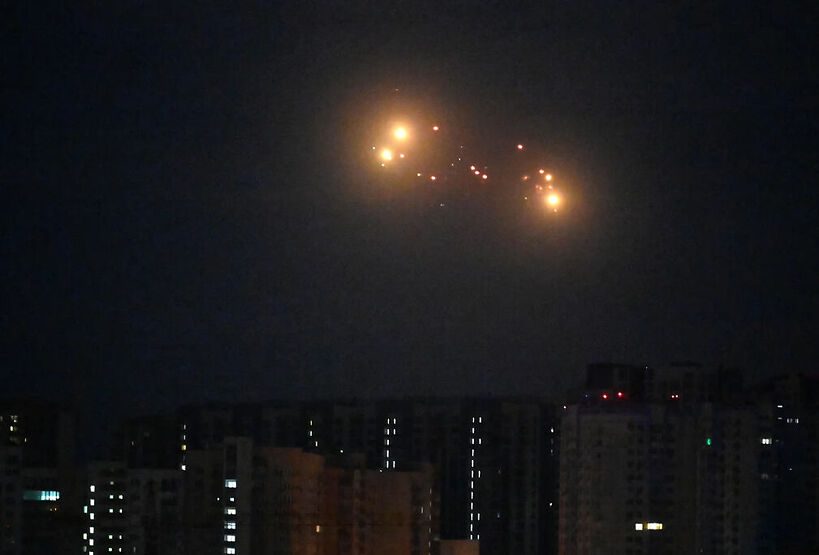
Although Russian drones and missiles have previously entered NATO members’ airspace including Poland’s, none had ever been directly intercepted before. NATO has long upheld the principle that an attack on one member equates to an attack on all. However, a NATO source told Reuters that the alliance is not classifying this drone incident as an “attack,” though it did appear deliberate.
Addressing parliament, Prime Minister Tusk said Poland recorded 19 violations of its airspace overnight, with at least three drones shot down. He stressed that no injuries were reported in the “Russian action.” Poland has formally requested consultations under Article 4 of NATO’s founding treaty, which allows any member to demand urgent talks if it feels its territorial integrity or security is threatened. This marked the eighth invocation of Article 4 since 1949, and the third relating to Russia’s actions in Ukraine.
Article 5; NATO’s most powerful clause, considers an attack on one member an attack on all. It has only been triggered once, after the September 11, 2001 terrorist attacks in the United States.
Meanwhile, Poland’s military said it was continuing search operations for potential crash sites. “The Operational Command of the Polish Armed Forces is closely monitoring the situation, with Polish and allied forces fully prepared for further action,” the military posted on X. Police confirmed the discovery of a damaged drone in Czosnowka, an eastern Polish village, while Reuters reported a separate building in another town had been hit by debris, though no casualties were reported.
Hours later, the military declared operations concluded but said the hunt for wreckage was ongoing. Citizens were warned not to touch or move unidentified debris, as it could contain hazardous materials. The Polish government also called an “extraordinary” meeting on Wednesday morning.
The incident coincided with a Russian barrage across Ukraine, including strikes in Lviv, about 50 miles from Poland’s border.
Ukrainian President Volodymyr Zelenskyy said eight Russian drones had been directed toward Poland during the overnight assault, calling it “an extremely dangerous precedent for Europe.” Foreign Minister Andriy Sybiga warned that Putin is “escalating, expanding his war, and testing the West. A weak response now will only embolden Russia further and missiles and drones will eventually fly deeper into Europe.”
Polish President Karol Nawrocki echoed the warning, saying during a press conference in Helsinki: “We do not trust Vladimir Putin’s intentions. We believe he is prepared to invade other countries as well.”
European Commission President Ursula von der Leyen called Moscow’s actions “reckless and unprecedented,” while EU diplomat Kaja Kallas reiterated that the violation was “intentional.”
Poland, a key supporter of Ukraine and home to over a million Ukrainian refugees, has consistently faced spillover from the war. In recent years, Russian missiles and drones have crossed its airspace, including a drone that exploded in farmland in 2024, a missile in 2023, and a Ukrainian anti-aircraft missile in 2022 that killed two civilians in a border village
